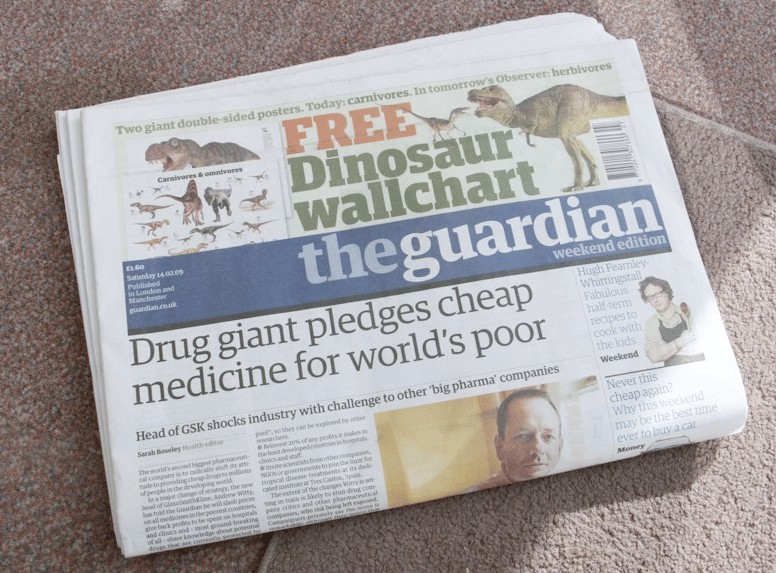
His reporting has helped expose arms payments by BAE, secret US government cable messages and lately has focused on News Corporation. Now The Guardian’s influential investigations editor and assistant editor is mooting a controversial option to fund the future of journalism.
“Consumers won’t pay for online news,” David Leigh writes on Guardian.co.uk. “A small levy on UK broadband providers – no more than £2 a month on each subscriber’s bill – could be distributed to news providers in proportion to their UK online readership.”
Leigh reckons such a levy would raise more than £500 million per year: “It could be collected by a freestanding agency, on the lines of the BBC licence fee, and redistributed automatically to ‘news providers’ according to their share of UK online readership.
 “This would solve the financial problems of quality newspapers, whose readers are not disappearing, but simply migrating online.”
“This would solve the financial problems of quality newspapers, whose readers are not disappearing, but simply migrating online.”
Handily, Leigh says his plan would return £100 million each to his Guardian Media Group, Telegraph Media Group and Associated Newspapers, based on current audience share.
Leigh is basing those sums on this month’s National Readership Survey (NRS), which, for the first time, included both print and online reader numbers. Had Leigh calculated levy income prior to the latest NRS, The Guardian, whose print-only readership is mid- to low-table, would receive far less.
Leigh says his plan would hand less money to News International’s Times Newspapers since it has a lower digital audience because it charges for its content.
Arguably, The Telegraph does not need a subsidy – it made a £54.5 million pre-tax profit last year. Daily Mail publisher Associated is also a commercial force. Guardian News & Media’s annual operating loss grew by 42 percent to £44.2 million last year.
Although some may baulk at the idea of state funding for news organisations that hold the state to account, there are several examples in which public journalism financing is kept at arm’s length from government. Nordic countries have been subsidising newspapers for decades. One estimate has it that US newspapers and magazines already receive $900 million per year purely in tax breaks. Leigh argues: “The levy would, like the BBC, be operationally ring-fenced against ‘state intervention’.”
 What Leigh’s intervention does point to is the critical juncture at which the news business finds itself. Budgets for investigations of the sort Leigh carries out are widely said to be shrinking.
What Leigh’s intervention does point to is the critical juncture at which the news business finds itself. Budgets for investigations of the sort Leigh carries out are widely said to be shrinking.
The article in which Leigh makes his argument is not necessarily reflecting Guardian News & Media policy. The publisher believes charging for web content won’t work and will limit its potential audience, though it does charge for mobile editions and apps, while editor-in-chief Alan Rusbridger has previously mooted the idea of state subsidy for local newspapers.
In a recent report on The Future Of Investigative Journalism, the House Of Lords’ communications select committee rejected direct state subsidy, saying: “We are concerned that, if these are levied on struggling or loss-making organisations, they will merely compound the problem of pressure on limited financial resources, not help to solve it.”
Leigh says the “continued survival (of news content) is generally agreed to be a fundamental plank of democracy”. If no action is taken, “in the long term, all the newspapers might otherwise be dead“.
Leigh’s idea has also been backed by former Daily Mirror editor Roy Greenslade, an influential Guardian media commentator, as an “ingenious thought”, “clever” and a “magic bullet”. But News International’s customer management director Chris Duncan told paidContent the idea is “lunacy” and “disincentivises all paid content conversion”.
ISPs would likely object to being forced to hike their prices to collect a levy, which would represent the thin end of a wedge for them. After much lobbying, they eventually avoided such an option in respect of audio and video content by agreeing to more proactively filter for illegal downloads and to introduce their own commercial download services.
Loss-making Guardian News & Media is cross-subsidised by adjacent businesses inside Guardian Media Group, many of which the parent has been selling off. GMG also owns stakes in Trader Media Group and Emap/Top Right, which will earn it a windfall when it sells them in the future as it intends. After that windfall runs out, GNM may need a real, functioning and profitable business model. The current main idea has been building up US audience scale against which to sell advertising.
Disclosure: Guardian News & Media is an investor in paidContent’s publisher, Giga Omni Media.